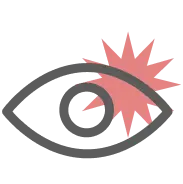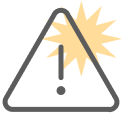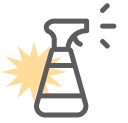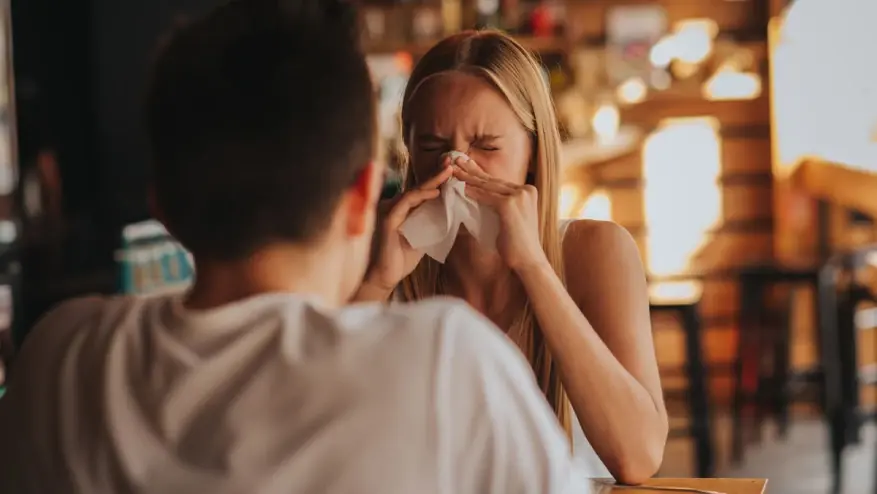The Link Between Allergies and Sinus Infections
When you have an allergy to triggers such as pollen, mold, dust, or pet dander, your nasal and sinus passages work to flush these particles when they're inhaled. This process leads to inflammation and swelling in those passages. As a result, mucus becomes trapped, making it easier for bacteria and viruses to enter and potentially cause an infection.1,3
This process can create a perfect storm for chronic sinus infections. The persistent inflammation and blockage prevents the sinuses from draining properly, creating a warm, moist environment where bacteria thrive.
Over time, continuous inflammation can lead to even more swelling and further blockage, making it harder for the sinuses to drain. Meanwhile, your body's production of extra mucus to flush out the allergens only adds to the buildup. This activity can strain your immune system, making you more susceptible to infections, bringing about a possible sinus infection from allergies.7
Untreated allergies — specifically allergic rhinitis where the nose is affected — can lead to long-term health issues like chronic sinus infections that significantly impact quality of life. Untreated allergic rhinitis may lead to long-term health issues.12
Sinus Infection vs Allergies
Understanding the connection between these two conditions can help you find the right treatments to keep you feeling your best.
Allergy symptoms 2,4

Sneezing

Sore throat aggravated by mucus

Itchy nose, throat, and eyes

Red or watery eyes
Sinus infection symptoms1,3

Discolored nasal discharge (greenish in color)

Facial/sinus pressure (particularly around your nose, eyes and forehead)

Pressure or pain in your teeth

Ear pressure or pain

Fever

Bad breath (halitosis) or a bad taste in your mouth
Symptoms of both

Postnasal drip

Runny nose

Congestion/stuffy nose

Sinus headache
Sinus Infection Symptoms and Causes
Sinusitis, or a sinus infection, is inflammation or swelling of the tissue lining the sinuses, which are air-filled cavities located behind the forehead, nose, and cheekbones. Sinus infections can be caused by bacteria, viruses, or fungi.1 Research also suggests chronic allergic rhinitis may lead to sinus infections.11 Symptoms of a sinus infection include:1,3

Postnasal drip (mucus dripping down your throat)

Runny nose with thick yellow or green mucus

Stuffy nose

Facial pressure (particularly around your nose, eyes and forehead). This might get worse when you move your head around or bend over

Pressure or pain in your teeth

Ear pressure or pain

Fever

Bad breath (halitosis) or a bad taste in your mouth

Headache

Tiredness
If you think you may be experiencing a sinus infection talk to your healthcare provider. They may prescribe treatments like antibiotics or steroid sprays depending on the cause of the infection.3
Allergies Symptoms and Causes
Allergies are an overreaction of the immune system to a foreign substance, such as pollen, dust mites, or pet dander. Symptoms of allergies can include:2,4

Sneezing

Itchy nose, throat, and eyes (eyes may also be watery)

Runny nose

Nasal stuffiness (congestion)

Postnasal drip

Sinus Pressure
Allergy medications, like ZYRTEC®, can help relieve your worst allergy symptoms, such as sneezing, runny nose, itchy, watery eyes, and itching of the nose or throat. Whether they’re from seasonal or year-round allergies, if you tend to suffer from nasal stuffiness (congestion) or sinus pressure from your allergies, ZYRTEC-D® may be an option for you. Learn more about the ZYRTEC® family of products.
Tips to Manage your Allergies
By taking steps to manage your allergies, you can help reduce the amount of swelling and inflammation in your nasal passages.2,5,6

Know your triggers
Know what sets off your symptoms and avoid these allergens as much as possible. Learn about the different allergy triggers in our Allergy Guide.

Get relief indoors
Use air purifiers and HEPA filters to remove allergens from the air. Turn on your air conditioner instead of opening the window during times of peak pollen.

Clean regularly
Regularly vacuum rugs and carpets and wash bedding and curtains to help remove dust, dander, pollen, and other allergens.

Change your clothes
Pollen and other allergens can stick to your clothes and hair so take a shower and change your clothes if you notice your symptoms are starting to flare.

Combine any of the above home remedies with OTC options to manage allergies
Try a nasal saline rinse to flush out allergens and mucus and try taking allergy medications, such as antihistamines or decongestants. ZYRTEC® is a trusted and safe over-the-counter option that can help relieve your worst allergy symptoms.
When to See a Medical Professional
It’s important to see a doctor if you have symptoms of a sinus infection or allergies that do not improve with home treatment. Your doctor can diagnose the cause of your symptoms and recommend the best treatment for you.
Explore ZYRTEC® products for your allergy needs
Untreated allergies may lead to sinus infection. Get allergy relief from ZYRTEC®, the #1 doctor and allergist recommended OTC allergy brand when it comes to oral antihistamines. Shop our collection of products here.
References
https://acaai.org/allergies/allergic-conditions/sinus-infection/
https://my.clevelandclinic.org/health/diseases/8610-allergies
https://my.clevelandclinic.org/health/diseases/17701-sinusitis
https://my.clevelandclinic.org/health/diseases/8622-allergic-rhinitis-hay-fever
https://www.mayoclinic.org/diseases-conditions/allergies/diagnosis-treatment/drc-20351503
https://acaai.org/allergies/allergic-conditions/seasonal-allergies/
https://www.jacionline.org/article/S0091-6749(00)44765-2/fulltext
https://aafa.org/asthma/living-with-asthma/asthma-in-adults/
https://www.allergy.org.au/patients/allergic-rhinitis-hay-fever-and-sinusitis/sinusitis-and-allergy/
https://allergyasthmanetwork.org/allergies/nasal-allergy-allergic-rhinitis/
Links to other parties’ articles and websites are provided for convenience only. Kenvue is not responsible for their content.




